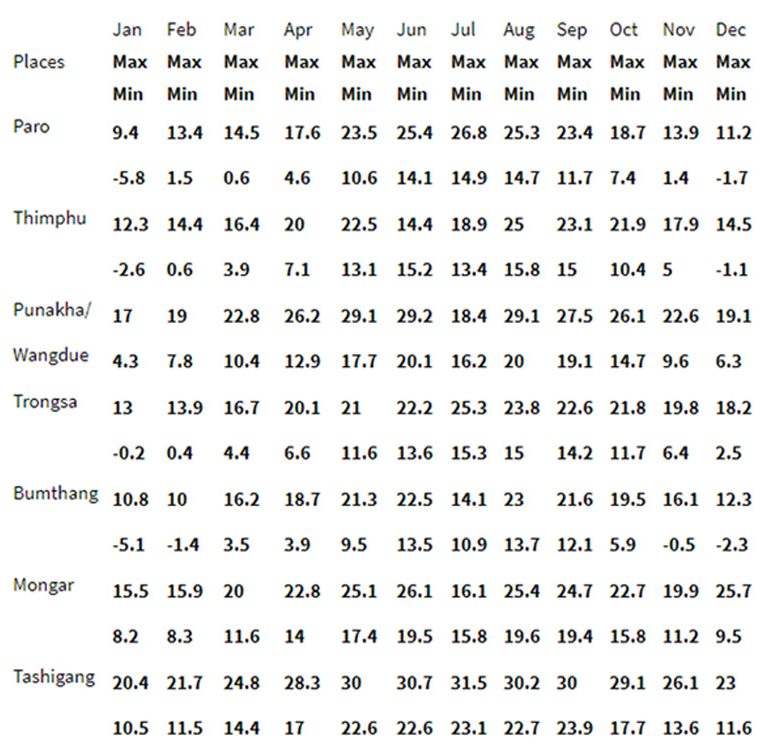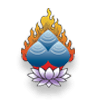Indian Travelers -Useful Information for Indian Travelers
Accessibility
Entry into Bhutan can be made either by land or by air, Druk Air, the National Air carrier of the kingdom, operates regular flights to / from Paro to Delhi, Kolkata, Kathmandu and Bangkok. By surface, entry into Bhutan is possible through southern border town of Phuentsholing. This frontier town is about 6 hours drive from Thimphu and Paro, 4 hours drive from Bagdogra and 7 hours drive from Darjeeling and Gangtok.
Druk Air, Bhutan’s National Air Carrier offers special fare for Indian nationals which are as under:
Dehli/Paro or vice versa = Rs. 7,750/+ taxes
Kolkatta/Paro or vice versa = Rs. 4,000/ +taxes
Kathmandu/Paro or vice versa = Rs. 4,000/ + taxes
Dhaka/Paro or vice versa = Rs. 4,260/+ taxes
Bangkok/Paro or vice versa = Rs. 10,000/+ taxes
Gaya/Paro or vice versa = Rs. 4,000/+ taxes
Yangon/Paro or vice versa = Rs. 7,630 + taxes
The above given fare is for economy (Y class) seat and for business class (J class) the fare is same as other nationalities. The fare for children and Infant is as given below:
CHILD FARE:
67% of Y class fare and 75% of J class fare on Delhi, Kathmandu v.v. sectors
75% of normal fare from Bangkok to Paro
67% of normal fare between other destinations I
NFANT FARE:
10% of normal fare
Entry/Route Permit
Entry Permit
Indian Nationals travelling between Bhutan & India do not need Visa. An identity document, be it either passport or an election commission I.D card is, however required for presentation at the immigration during entry, to obtain an entry permit along with 06 passport size photographs. An Affidavit from Supreme Court is needed for those who don’t have any of the above documents.
Indian Nationals travelling between Bhutan and Nepal require valid passport as per Nepalese immigration regulation.
Route Permit
It is required for those travelling to restricted areas beyond Dochula pass. The Route Permit is processed & issued in Thimphu, only after arrival in Bhutan and on production of the entry permit. Two copies of passport size photos required while processing Route Permit. Also this permit can be processed only during working days (Mon-Fri) and applications are accepted from 9-11 a.m and permit granted on same day from 3-5 p.m in summer and 3-4 p.m in winter.
Climate/Cloths/Food
Climate
Bhutan’s climate is quite unpredictable. The weather can vary dramatically from place to place and day to day. In Thimphu and Paro valleys, the winter daytime temperature averages 16 degrees Celsius during clear days and drop well below freezing point during the night. The fluctuations are not so great during the summer and the daytime temperature rises to mid-twenties Celsius.
Cloths
From May to September, cotton cloths are sufficient, plus a woolen sweater or light jacket. From November to the end of April, however, you will need very warm clothes. Comfortable sports shoes are also recommended. Mountains boots are not necessary unless you are trekking.
Food
Bhutanese delicacies are rich with spicy chillies and cheese but are normally tempered to the taste of the visitors. All our hotels and lodges offer delicious Indian, Chinese, Continental and Bhutanese cuisine. Hotels normally serve a mixture of vegetarian and non-vegetarian items on buffet style however pure vegetarian meals also served on request and prior information.
Currency/Language/Religion/Time
Currency
The Bhutanese currency is called Ngultrum (Nu.) and is at par with Indian Rupee. Credit cards (Amex and Visa cards) are accepted by only few limited establishments and no ATM centers are available. Indian Rupee is acceptable all over Bhutan however it is also advisable not to carry Rs. 1000/ and Rs. 500/ denomination currency notes.
Language
The official language of Bhutan is Dzongkha and a large number of dialects are spoken. English has been the language of educational instruction since 1964 and is widely spoken. Also locals at popular tourist destinations understand and speak Hindi.
Religion
Mahayana Buddhism is the state religion and the majority of Bhutanese people follow Drukpa school of the Kagyupa.
Time
Bhutan is half an hour ahead of IST (Indian Standard Time).
Security/Telephone/Photography
Security
Bhutan is very safe destination with lowest crime rate in the world. In general you will find Bhutanese people very warm, hospitable, helpful and friendly.
Telephones
Telecommunication is well developed and efficient in Bhutan. The country code is +975. If you wish to bring your own mobile phone please contact your manufacturer/supplier directly to obtain up-to-date information.
Photography
You can photograph almost everywhere in Bhutan. The people are highly photogenic and everyone seems to wear a smile. However, very often the Bhutanese are camera shy so use your discretion at all times and when in doubt ask verbally or by gesture. Also while photographing Dzongs, monasteries and temples; please check with your guide.
Shopping/Customs
Shopping
Shops are normally open between 0900-2000 Monday to Sunday. Markets are held regularly and are a rich source of local clothing and jewelry.
Customs
The Bhutanese authorities strictly monitor export of any religious antiquities of any kind form the kingdom, Personal electronic devices and reasonable amount of cigarettes and alcohol are permitted into the kingdom.
The following goods may be imported into Bhutan:
-200 cigarettes or 50 cigars or 250g of tobacco
-1 litre bottle of spirits
-250ml of eau de toilette
Electricity/Gratuities/Departure Tax
Electricity
The voltage supply in the Bhutan is 220 volts AC, 50 Hz. Standard Indian round pin sockets are normally used at all places.
Gratuities
Tipping is not included in our tour prices and its at your discretion.
Departure Tax
If you are departing by air, there is departure tax of Nu. 300 (Rs. 300), payable at Bhutan’s Paro International Airport.
Important Notes
-Ta Dzong (National Museum): Paro
Opening Hours: Tuesday-Saturday: 9 a.m-4 p.m & Sunday: 11a.m-4p.m
Closed on Mondays & National Holidays
-School of Arts & Crafts: Thimphu
Opening Hours: Monday-Friday: 2p.m-4p.m & Saturday: 9a.m-12a.m
Closed on Sundays, National Holidays and Winter Holidays (20 December-10 March)
-National Library: Thimphu
Opening Hours: Monday-Friday: 9a.m-5p.m (summer) & 9a.m-4p.m (winter)
Closed on Saturdays, Sunday & National Holidays
-National Textile Museum: Thimphu
Opening Hours: Tuesday-Friday: 9a.m-4p.m, Saturday: 1 p.m-4p.m, Sunday: 10a.m-3p.m
Closed on Mondays & National Holidays
Punakha Dzong: closed in winter months when the monk body is in Punakha
-All visits to Dzongs and Monasteries limited till courtyard only.
-Visit to Trashichhodzong permitted only after office hours (after 4p.m) in winter months when the monk body is not in Thimphu.
All tourists visiting Dzongs and temples must be dressed appropriately in their own national dress, leave shoes/scandals/caps at the entrance of temple and other appropriate personal decorum should be followed.
Temperature

Distance & Driving Time between Places of Tourist Interest
All mode of transport with in Bhutan is by road and there are no domestic airlines and trains. The motor able roads are well maintained and connect most of the places. However the mountainous terrain and winding road restrict the average driving speed of vehicle to about 35 km per hour.
Hotels used on tour:
Hotel Olathang, Paro
Tel: 00975-8-271304/271305
Fax: 00975-8-271454
Hotel Motithang, Thimphu
Tel: 00975-2-322435/323890
Fax: 00975-2-328058
Hotel Zangtho Pelri, Punakha
Tel: 00975-2-584125
Fax: 00975-2-584203
Sherubling Lodge, Trongsa
Tel: 00975-3-521116
Fax: 00975-3-521107
Wangdichholing Lodge, Bumthang
Tel: 00975-3-631107 F
ax: 00975-3-631138
Hotel Namgay, Phuentsholing
Tel: 00975-5-252374/253947
Fax: 00975-5-254147


